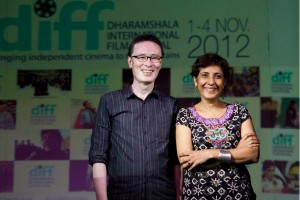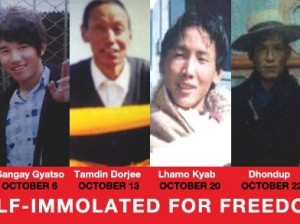The Dharamsala International Film Festival (DIFF) will debut on 1 November and run for 4 days. The festival is an attempt to bring international filmmakers and their movies to the foothills of the Himalayas. Twenty-four movies will be shown covering a broad spectrum from documentaries to feature films, with filmmakers coming from countries including India, Germany, and Japan. Approximately 70 volunteers, both individuals and volunteers from various organizations in Dharamsala such as Lha, will help to make the festival run smoothly. In addition to the film screenings, there will also be two panel discussions, the first about the future of film in Indian, and the second about the struggles filmmakers face when doing documentaries in regions with conflicts.
Ritu Sarin is director and organizer of this first edition of the festival. Her film When Hari got Married, which she directed together with DIFFs co-director Tenzing Sonam, is about India’s tradition of arranged marriages. A well worth seeing, funny, and authentic movie about a life caught between tradition and modernity, and the personal pursuit of happiness.
Ritu Sarin spoke to Contact Magazine about her movie and the festival itself:
Contact Magazine: Do you think Hari is a typical Indian husband?
Ritu Sarin: I don’t think Hari is typical in any way. He’s quite an unusual character. In some ways we see through his eyes the kind of dilemma and the pressure that people feel. India is changing very fast so on the one hand you are living in a very traditional society and on the other side- especially the area around Dharamsala because of tourism, people have a lot of exposure to the outside world. So people are actually struggling between two different worlds. So that’s something Hari is. He is very much like other people in this area but what his personality concerns he’s unusual.
CM: How did you get the idea to make this movie?
Sarin: We have known Hari since he was 16 and we know him and his family quite well. They are our neighbors and live in the village next to us. He kept talking about his wedding- first about meeting a girl and then about marrying itself. So this went on for about two years. And a little while before the wedding I got the idea to film it and then see what happens- see what kind of footage we have. And once we had shot the footage we thought that he’s a great character and that we would like to make this film.
CM: With what kind of feelings are you expecting the first of November?
Sarin: It’s really exciting because it’s our vision we had for a few years now to have a festival like this here. But at the same time it’s kind of daunting.
CM: What was your motivation to create this film festival?
Sarin: We wanted to do something good for this area and for all the communities that live here- Indian, Tibetan- and to bring everyone together, to help the tourism, inspire the youth, and create a new place for independent cinema.
CM: Where do you see the festival in 5 years?
Sarin: I hope that this will be THE FESTIVAL for good independent cinema in India. And I hope that it will inspire the young people in this area to make films and to be more creative.





 Print
Print Email
Email